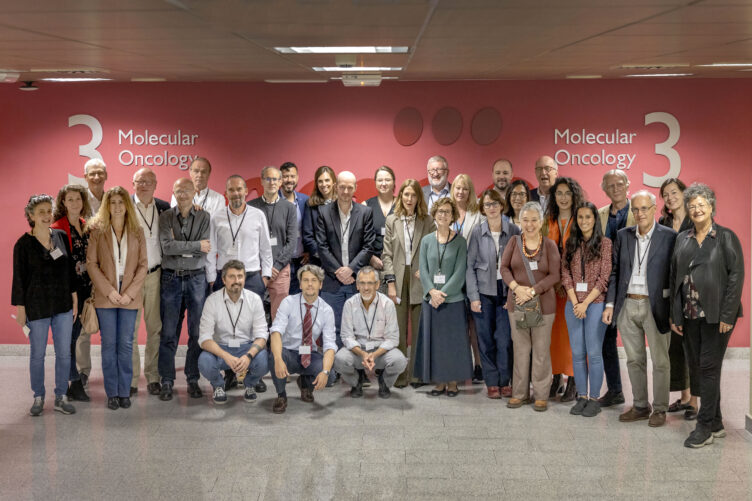This website uses cookies so that we can provide you with the best user experience possible. Cookie information is stored in your browser and performs functions such as recognising you when you return to our website and helping our team to understand which sections of the website you find most interesting and useful.
 Members of the multi-stakeholder platform Pancreatic Cancer Europe in the meeting held at CNIO. /Antonio M. Tabernero. CNIO
Members of the multi-stakeholder platform Pancreatic Cancer Europe in the meeting held at CNIO. /Antonio M. Tabernero. CNIO
Participants in a meeting held at the Spanish National Cancer Research Center (CNIO) by the multi-stakeholder platform Pancreatic Cancer Europe are worried about the rise of pancreatic cancer among a younger-than-usual population and in women.
They seek to organize a registry of long-term pancreatic cancer survivors, to understand what makes them different from the vast majority of patients who die in less than a year.
Another goal is for all pancreatic cancer patients in Europe to enter clinical trials and provide bio-samples and detailed clinical and genomic information.
The incidence of pancreatic cancer is increasing, without any clear reason why. ” It is already a public health problem in Europe,” explain researchers from the Spanish National Cancer Research Center (CNIO) Núria Malats and Francisco X. Real, organizers of the conference that brought together researchers, clinical oncologists, surgeons and representatives of patients, pharmaceutical companies and European institutions.
The meeting sought to define the ‘road map’ of actions that, according to the participants, would promote advances in pancreatic cancer research, a tumor they describe as “forgotten” due to the few treatment options available, among other reasons. This was an initiative of Pancreatic Cancer Europe, a platform to raise awareness of the need for progress in pancreatic cancer control.
The conclusions of the meeting will be passed on to multiple institutions involved in cancer, such as the European Commission, the various research funding agencies in Europe, scientific and medical societies, and patient associations.
More efficient clinical trials
To drive progress in pancreatic cancer, meeting participants feel it is necessary, among other measures, to identify centers of excellence in Europe for pancreatic cancer patient care and research. This would help coordinate clinical drug trials more efficiently.
They also propose that all pancreatic cancer patients in Europe enter clinical trials, and provide bio-samples with detailed clinical and genomic information.
Equally valuable, they add, is the creation of a registry of long-term surviving pancreatic cancer patients, with clinical and epidemiological information and an associated biobank.
“The time is now”
The median overall survival of a person diagnosed with metastatic pancreatic cancer is seven months, one of the lowest among cancer patients. “It is an aggressive tumor that is increasing in younger population and in women, something we haven’t seen before,” Malats says.
“We could make a lot of progress in this very complex problem in the next 20 years, but only if we start working now and in a systemic way, not in a fragmented way,” says Real.
The CNIO researchers organizing this meeting argue that the time is ripe to promote pancreatic cancer research: “A change in perception is taking place. Twenty years ago no one wanted to work on pancreatic cancer because it is a such a difficult tumor. But great young researchers are now working on this cancer all over the world, and we have to take advantage of that. The time is now”.
